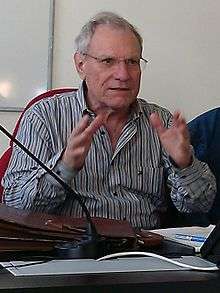Philippe C. Schmitter

Philippe C. Schmitter (Washington DC, 1936) is an Emeritus Professor of the Department of Political and Social Sciences at the European University Institute. Since 1967 he has been successively assistant professor, associate professor and professor in the Politics Department of the University of Chicago, then at the European University Institute (1982–86) and at Stanford (1986–96). In 1996 he returned to the European University Institute, where he retired in 2004.
He has published widely on comparative politics, European and Latin America regional integration, transitions from authoritarian rule and democratization processes, and the intermediation of class, sectoral and professional interests. More recently he has been examining the possibilities for post-liberal democracy in North America and Europe.[1][2]
In 2009, Schmitter won the Johan Skytte Prize in Political Science for his "path-breaking work on the role of corporatism in modern democracies, and for his stimulating and innovative analysis of democratization". He also received the ECPR Lifetime Achievement Award by the European Consortium for Political Research in 2007, the EUSA Award for Lifetime Achievement in European Studies by the European Union Studies Association in 2009, and the Mattei Dogan Prize awarded by the International Political Science Association (IPSA) to a scholar of high international reputation in recognition of their contribution to political science in 2009.
Selected publications
- “The Nature and Future of Comparative Politics.” (2009) European Political Science Review 1(01): 33–61.
- “What Democracy Is. . . and Is Not.” (1991) Co-author with Terry Lynn Karl. Journal of Democracy 2(3): 75–88.
- Transitions from Authoritarian Rule: Tentative Conclusions About Uncertain Democracies. (1986) Co-author with Guillermo O'Donnell. Baltimore: Johns Hopkins University Press.
References
- ↑ http://www.eui.eu/DepartmentsAndCentres/PoliticalAndSocialSciences/People/Professors/Schmitter.aspx European University Institute - Biography of Philippe C. Schmitter (Accessed Dec 2010)
- ↑ http://www.thefutureofrepresentativedemocracy.org/ The Future of Representative Democracy - Biography of Philippe C. Schmitter (Accessed Dec 2010)
|